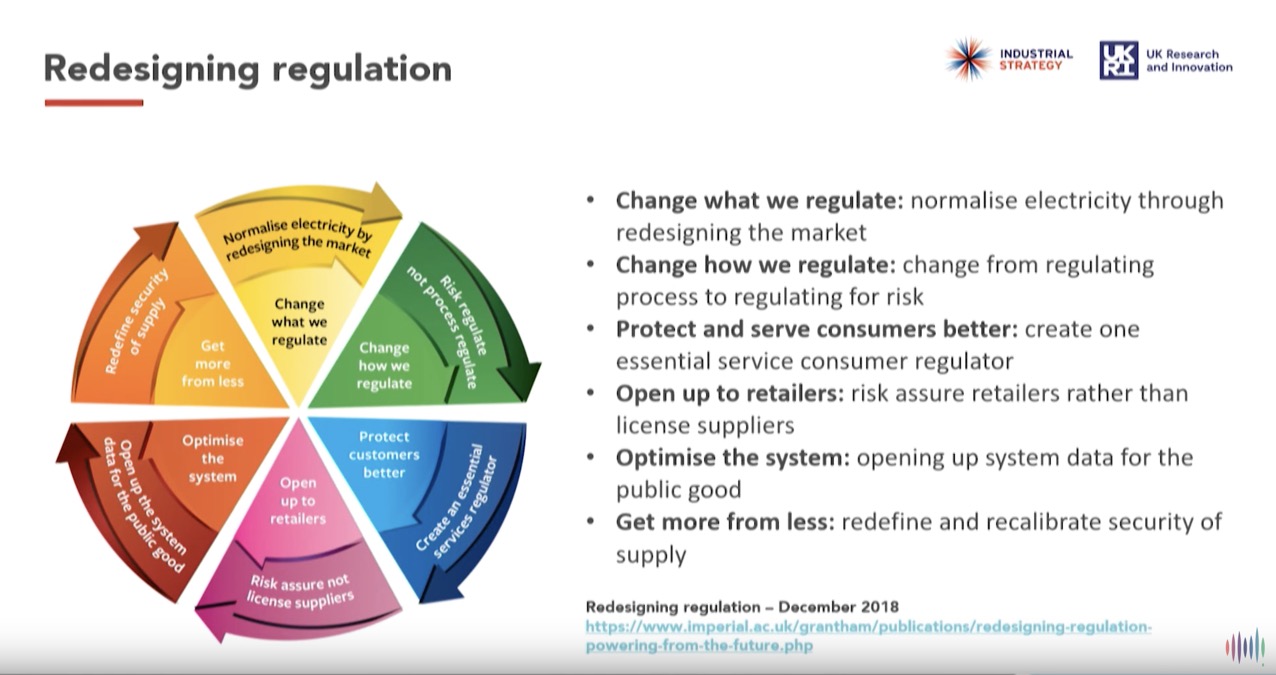
The UK is moving much faster than Australia towards net zero emissions. What can we learn from the Poms?
I’m often wary when I hear someone say “regulation is getting in the way of innovation”, because it’s so often led to disastrous deregulation of things that matter – public safety, building regulation, product safety and the like.
However, in this early-March Sydney speech posted to YouTube, Dr Jeffrey Hardy, of Imperial College London’s Grantham Institute, makes a convincing argument that energy market regulation is hobbling the development of business models that would help the UK get to its net zero emissions target. The video is well worth watching in its entirety.
In the speech, “(User-centric) UK Zero Carbon Energy Futures”, Dr Hardy’s contention is that while the world has nearly all the technology needed to reach a zero carbon target, consumer behaviour has to change as well.
Technology “absolutely isn’t” the answer, he said, “because only around 38% of the carbon savings are pure technology plays, where you replace something with something else.”
While there will be a lot of “new kit”, he said, “the rest has something to do with behaviour”, such as changing peoples’ mode of travel (to EVs) or heating (the ubiquitous gas boiler in UK households); and changes to social behaviour (less flying is a good example).
“You cannot do this transition without people doing things differently and willingly,” he said.
Getting people to change their behaviour willingly means the industry needs to invent products and services encouraging change:
“This is a massive opportunity for data-driven, more consumer centric business models”, stated Dr. Hardy.
Consumers Are Ready
Because of the huge profile the environment has in UK politics (wouldn’t it be nice if Australia caught up?), consumers are already showing the willingness Dr Hardy said is needed.
“Consumers are prepared to play their part in the transition,” he said, but what they get in the future “has to be better” than what the industry delivers today.
But you need a definition of “better”, because it’s one of those words that can mean pretty much anything.
It’s hard to imagine “better”, though, if people don’t know what kind of products and services might exist in the future.
Dr Hardy said one characteristic of future energy products will be that they match demand to supply, rather than the other way around:
“It makes much more sense for demand to follow supply, because that’s when energy is going to be cheapest, as long as you can get it from A to B”.
And the business opportunity is huge he said, citing research conducted by his organisation together with Leeds University that identified a possible £21 billion “pool of untapped value” available to UK retailers, on the way to 100% renewables.
These include between £75 and £1,809 million in plant efficiency; £5 to £9 billion in new services, up to £4.6 billion in local low carbon generation and up to £8 billion in large-scale low carbon generation, up to £2 billion in “flexibility optimisation”, and up to £1.7 billion in carbon capture and storage.

Going 100% renewable offers new business opportunities
The Role Of Regulation
Why is regulation standing in the way of the “new services” slice of that value pool? Because, he said, UK energy market regulation today concentrates on processes – how billing works, what is printed on the bill, how retailers answer the phone and so on.
The shift to a more complex services model, in which one provider might focus on EV charging packages while another encourages peer-to-peer energy supply at a local level, simply doesn’t fit with how UK energy market regulation now operates.
“There are a lot of companies exploring energy-as-a-service”, Dr Hardy said, but the same model underpins all of them: a service provider depends on selling a commodity, in a world that’s consuming less of the commodity.
“By the time you get through [the UK’s] regulatory spaghetti … there’s only one model you can be: just a bill with a different sticker on it.”
That’s what Dr Hardy would like to see change. Rather than regulating processes, he wants the regulatory environment to encourage new energy business models (without sacrificing consumer protection and supply stability).
Dr Hardy said his teams have identified six characteristics of a future market that can inform how we regulate future energy markets:
- Energy retailers need to be more like other retailers – supermarkets, with their data-driven understanding of how to shift multiple products, rather than living in the old world of selling a single, simple commodity. This needs to be accompanied by “risk-based” regulation rather than process regulation. The retailer would be responsible for convincing the regulator it has properly risk-assessed its proposed new product, possibly with new insurance products that would help mitigate potential harms.
- The market will move to more bundling. For example, you might get your transport, electricity, entertainment and telecoms from the same company. It might make sense to bring consumer regulation under a single entity, “because it might not make sense if there’s no visibility between different services.” He said there’s a parallel discussion about whether economic regulation in the energy market still needs to be in different sectors.
- With more service provider freedom to create business models, “the regulator’s going to have to have a commensurately large hammer to bring down on bad behaviour … potentially putting CEOs in jail”1.
- The regulator has to “be better at data than any of the companies … it cannot be in the centre pulling levers, it has to be at the perimeter looking in, spotting trends, spotting things that might result in harm”.
- Data becomes “incredibly important”, and while this will almost inevitably lead to strong industry opposition, “energy data should be considered a public good, and therefore open.”
- He also said the industry has to take a new look at how it achieves security of supply, switching from the old habit of “security means build more stuff” to managing demand so as to avoid building new generation.
Finally, the Q and A session following the talk is below. Particularly interesting is Dr Hardy says based on his research, the Australian Government’s latest ‘Technology Roadmap’ approach to reducing emissions will simply not work…
Footnotes
- note from Finn: hang on a minute! ↩


 RSS - Posts
RSS - Posts



Dr Jeffrey Hardy seems to have lost his way forward, and his contribution is a distraction from the real issue “the global energy imperative”.
He needs to get back on track and apply his considerable talents and skills where they really belong in a global scientific context.
We are all fully aware by now that globally a sense of urgency has entered discussions regarding the technological imperatives that must be met to massively electrify and industrialize developing nations to modern standards in all ways and means, as well as transition away from fossil fuel generation to a primary non-polluting generation technology that will reduce global GHG emissions to insignificant levels.
Nothing less will cut it; and Dr Hardy trivialising this key point with a miniscule local vision is all about scientific capitulation rather than useful globally focussed modern age commentary.
This is the critical challenge (despite Dr Jeffrey Hardy’s interests elsewhere) , and the clock is ticking before runaway GHG effects will become impossible to mitigate with devastating consequences, including the disintegration of global social structures, that will increasingly and through sheer necessity, become the disruptive global society norm.
With emissions rising and the realisation that without drastic action, the world is on a track to precipitate a runaway climate change situation by the end of the century; recognition is growing of the need for a new level of ambition in current efforts to decarbonise and transform the global energy system.
The incumbent primary global fossil fuel (coal) generation technology, as a major contributor to the urgent climate change issues unfolding, has a diminishing future to one of minor significance within 40 years as a future global generation technology.
Decarbonisation of the industrial, heating, transportation, as well as the development of zero emissions power generation, will be the whole focus of the new frontier age of power generation science this next 50 years.
The global renewables technology development sector (across the board) remains fragmented and lacks any capacity at all for sustained long-term investment and development on a global scale, to massively electrify and industrialize developing nations as well as satisfy the permanent ongoing redevelopment imperatives of developed nations. The global renewables sector is effectively dead in the water and firmly tracking on the obsolescence pathway; and will most certainly diminish rapidly to be of minor (and boutique circumstances only) significance by 2050 at most.
The world’s best and brightest physicists, scientist’s, researchers and engineers are well aware of the numbers and the inexorable scientific pathway forward. NANS technology (new age nuclear solutions) being at the apex of power generation science, is the only practical form of power generation technology that has the exploitable attributes that can satisfy the global energy imperative going forward in perpetuity.
Remain mindful scientists and commentators, that there are 7 billion people on earth today, and by 2045 that number will read 11 billion.
A recap on the key technological attributes of the “global energy imperative” that are essential moving global energy generation science forward (in broad terms) are:-
1. Must be an energy dense technology at the apex of the energy science pyramid, and be able to deliver massive, safe, clean and low-cost energy;
2. Replace all other forms of inefficient and polluting energy generation sources globally, and reduce global greenhouse gas emissions to insignificant levels permanently;
3. Be modular and scalable and easily deployed cost effectively to power new age energy intensive technologies, industries and businesses everywhere;
4. Be available through modular design to cost effectively benefit all people, villages, broader communities, states and nations throughout the world – effectively and decisively.
Lawrence Coomber
As a purely technological pragmatist with zero vested interests, I 100% agree with you Lawrence – we also have to deal with agricultural emissions (eg cattle methane) and I’d be interested to here your thoughts on this.
But boy, are you going to get a blast from Geoffrey Miell – who I think is incredibly narrow-focused, and will stridently squawk his heart out (a la Chicken Little) without considering the big picture. If we squawk too much, the average punter is going to “give up”, and simply ignore efficiency demands. I’d rather look at how the required increase in non-polluting energy CAN be provided as quickly as possible, without the hyperbole.